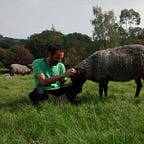Is the lemon using us, or are we using the lemon?
When we look at things, deep down, whether we realize it or not, we’re looking at a part of ourselves.
Let’s take, for example, the question raised by Francesca Pachetti in a recent post: does lemon make its fruits for me? And does the hen do the eggs for me?
One way of approaching these issues is ecological: have our taste for the apple, its flavour, its timing, its colour, its nutritional properties co-evolved to benefit both man and apple? This is often the case, especially for fruit. In the case of the domestic hen it is only partially so — because that species exists only as a result of our selection, of our using it.
But are we using it or is it using us? Some say hallucinogenic mushrooms have “decided” to use our brains to perpetuate themselves. Ultimately, being psychedelic appears to have only one benefit: it gives a “pleasant” experience to certain animals. Stamets takes this further by suggesting that the Fungi as a kingdom are using us to colonize the other planets of the solar system. The same could be said of plants, which will use us to disperse their seeds wherever we go — unless cyborgs replace us ecologically.
Is it the lemon taking advantage of our hunger and evolutionary potential or is it man who exploits the generosity of the lemon? The key is, in my opinion, in the false give-receive dichotomy, not unlike that between compete-cooperate; both are extremely reductive, and betray a non-holistic perspective.
Giving and receiving, making the fruit and picking it up, laying the egg and “stealing” it, dying and turning into fertility are, basically and as Francesca suggests, the same gesture — and one that the ecosystem makes on and within itself. In our seeing these things as separate is the measure of our being dysfunctional.
“We don’t see things as they are, we see them as we are.”
When we look at ourselves, deep down, whether we realize it or not, we are looking at a part of all things. Of all things.
“Think you’re escaping and run into yourself. Longest way round is the shortest way home.” (J. Joyce)
